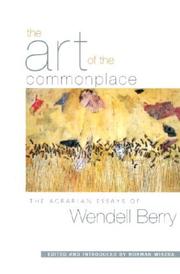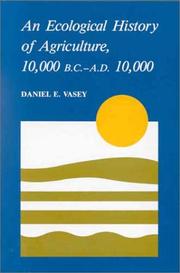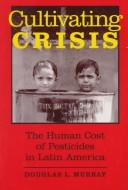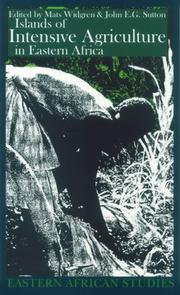| Listing 1 - 10 of 27 | << page >> |
Sort by
|

ISBN: 0824074041 Year: 1991 Publisher: New York London Garland Pub.
Abstract | Keywords | Export | Availability | Bookmark
 Loading...
Loading...Choose an application
- Reference Manager
- EndNote
- RefWorks (Direct export to RefWorks)
Digital
Year: 1836 Publisher: [Italy s.n.]
Abstract | Keywords | Export | Availability | Bookmark
 Loading...
Loading...Choose an application
- Reference Manager
- EndNote
- RefWorks (Direct export to RefWorks)
Book
ISBN: 9782200354404 2200354401 Year: 2013 Publisher: Paris: Armand Colin,
Abstract | Keywords | Export | Availability | Bookmark
 Loading...
Loading...Choose an application
- Reference Manager
- EndNote
- RefWorks (Direct export to RefWorks)
Pendant soixante ans, les sociologues ont observé le déclin des paysans et annoncé parfois leur disparition. De leur côté, les démographes constatent aujourd’hui que les producteurs agricoles n’ont jamais été aussi nombreux à la surface d’une planète à dominante urbaine. Cette contradiction constitue une question majeure pour les sciences sociales des mondes ruraux. Dans cette perspective, les auteurs proposent une relecture des « classiques ». Comment s’est structuré le débat entre ceux qui annoncent la fin des paysans et ceux qui pronostiquent leur maintien dans un état transformé ou prolétarisé ? L’ouvrage revient sur les grands bouleversements qui ont affecté les campagnes françaises et le métier d’agriculteur. Il analyse la place singulière et paradoxale occupée dans la société française par les agriculteurs : minoritaires mais segmentés, dispersés mais pourtant bien repérables comme force sociale et politique. Il propose enfin d’appréhender la recomposition des paysanneries dans la globalisation autour de trois pôles : la famille, la firme et la subsistance.
Sociology, Rural --- Farmers --- Sociologie rurale --- Agriculteurs --- Peasants --- Agriculture --- Social conditions --- History --- Social aspects --- Paysannerie --- Sociologie rurale. --- Peasants - France - Social conditions --- Peasants - France - History --- Agriculture - Social aspects - France

ISBN: 1593760078 9786612469497 1282469495 1582439249 9781593760076 Year: 2003 Publisher: Washington (D.C.): Shoemaker & Hoard,
Abstract | Keywords | Export | Availability | Bookmark
 Loading...
Loading...Choose an application
- Reference Manager
- EndNote
- RefWorks (Direct export to RefWorks)
The Art of the Commonplace gathers twenty-one essays by Wendell Berry that offer an agrarian alternative to our dominant urban culture. These essays promote a clearly defined and compelling vision important to all people dissatisfied with the stress, anxiety, disease, and destructiveness of contemporary American culture. Why is agriculture becoming culturally irrelevant, and at what cost? What are the forces of social disintegration and how might they be reversed? How might men and women live together in ways that benefit both? And, how does the corporate takeover of social institutions a

ISBN: 027103498X 9780271034980 9780271032740 027103274X 9780271032757 0271032758 Year: 2008 Publisher: University Park, Pa.: Pennsylvania state university press,
Abstract | Keywords | Export | Availability | Bookmark
 Loading...
Loading...Choose an application
- Reference Manager
- EndNote
- RefWorks (Direct export to RefWorks)
“One problem with the food system is that price is the bottom line rather than having the bottom line be land stewardship, an appreciation for the environmental and social value of small-scale family farms, or for organically grown produce.” —Interview with farmer in Skagit County, Washington For much of the later twentieth century, food has been abundant and convenient for most residents of advanced industrial societies. The luxury of taking the safety and dependability of food for granted pushed it to the back burner in the consciousness of many. Increasingly, however, this once taken-for-granted food system is coming under question on issues such as the humane treatment of animals, genetically engineered foods, and social and environmental justice. Many consumers are no longer content with buying into the mainstream, commodity-driven food market on which they once depended. Resistance has emerged in diverse forms, from protests at the opening of McDonald’s restaurants worldwide to ever-greater interest in alternatives, such as CSAs (community-supported agriculture), fair trade, and organic foods. The food system is increasingly becoming an arena of struggle that reflects larger changes in societal values and norms, as expectations are moving beyond the desire for affordable, convenient foods to a need for healthy and environmentally sound alternatives. In this book, leading scholars and scholar-activists provide case studies that illuminate the complexities and contradictions that surround the emergence of a “new day” in agriculture. The essays found in The Fight Over Food analyze and evaluate both the theoretical and historical contexts of the agrifood system and the ways in which trends of individual action and collective activity have led to an “accumulation of resistance” that greatly affects the mainstream market of food production. The overarching theme that integrates the case studies is the idea of human agency and the ways in which people purposefully and creatively generate new forms of action or resistance to facilitate social changes within the structure of predominant cultural norms. Together these studies examine whether these combined efforts will have the strength to create significant and enduring transformations in the food system.
Food supply --- Agriculture --- Sociology, Rural --- Food control --- Produce trade --- Food security --- Single cell proteins --- Social aspects. --- Social aspects --- Food supply - Social aspects --- Agriculture - Social aspects
Periodical
ISSN: 0889048X Year: 1984 Publisher: Dordrecht: Netherlands: Kluwer Academic Publishers, Springer,
Abstract | Keywords | Export | Availability | Bookmark
 Loading...
Loading...Choose an application
- Reference Manager
- EndNote
- RefWorks (Direct export to RefWorks)
Agriculture. Animal husbandry. Hunting. Fishery --- Agriculture --- Social aspects --- Periodicals. --- Aspect social --- Périodiques --- Social aspects. --- Agriculture Sciences --- Business, Economy and Management --- General and Others --- Business Management --- Economics --- Agriculture - Social aspects - Periodicals

ISBN: 0813809096 9780813809090 Year: 1992 Publisher: Ames (Iowa): Iowa state university press,
Abstract | Keywords | Export | Availability | Bookmark
 Loading...
Loading...Choose an application
- Reference Manager
- EndNote
- RefWorks (Direct export to RefWorks)
Agricultural ecology --- Agricultural systems --- Agriculture --- Agricultural industries --- Ecologie agricole --- Systèmes agricoles --- Industries agricoles --- History --- Social aspects --- Histoire --- Aspect social --- Agricultural systems. --- History. --- Social aspects. --- Systèmes agricoles --- Agriculture - History. --- Agriculture - Social aspects.
Book
ISBN: 9782707199232 2707199230 Year: 2019 Publisher: Paris: La Découverte,
Abstract | Keywords | Export | Availability | Bookmark
 Loading...
Loading...Choose an application
- Reference Manager
- EndNote
- RefWorks (Direct export to RefWorks)
"Aucun ouvrage n’avait jusqu’à présent réussi à restituer toute la profondeur et l’extension universelle des dynamiques indissociablement écologiques et anthropologiques qui se sont déployées au cours des dix millénaires ayant précédé notre ère, de l’émergence de l’agriculture à la formation des premiers centres urbains, puis des premiers États. C’est ce tour de force que réalise avec un brio extraordinaire Homo domesticus. Servi par une érudition étourdissante, une plume agile et un sens aigu de la formule, ce livre démonte implacablement le grand récit de la naissance de l’État antique comme étape cruciale de la « civilisation » humaine. Ce faisant, il nous offre une véritable écologie politique des formes primitives d’aménagement du territoire, de l’« autodomestication » paradoxale de l’animal humain, des dynamiques démographiques et épidémiologiques de la sédentarisation et des logiques de la servitude et de la guerre dans le monde antique. Cette fresque omnivore et iconoclaste révolutionne nos connaissances sur l’évolution de l’humanité et sur ce que Rousseau appelait « l’origine et les fondements de l’inégalité parmi les hommes »."
Agriculture --- Agriculture and state --- Origin --- History --- Social aspects --- Néolithisation. --- Néolithique. --- Société préhistorique. --- État --- Origines. --- Néolithisation. --- Néolithique. --- Société préhistorique. --- État --- Neolithic period. --- States. --- Origin. --- Anthropologie --- Etat --- Agriculture - Origin --- Agriculture and state - History --- Agriculture - Social aspects - History

ISBN: 0292751699 Year: 1994 Publisher: Austin University of Texas Press
Abstract | Keywords | Export | Availability | Bookmark
 Loading...
Loading...Choose an application
- Reference Manager
- EndNote
- RefWorks (Direct export to RefWorks)
Pesticides - Latin America. --- Pesticides - Toxicology - Latin America. --- Pesticides - Environmental aspects - Latin America. --- Cotton - Diseases and pests - Control - Latin America. --- Agricultural pests - Control - Latin America. --- Agriculture - Social aspects - Latin America. --- Pesticides - Economic aspects - Latin America. --- Produce trade - Latin America.

ISBN: 0852554281 0852554273 9780852554289 9780852554272 Year: 2004 Publisher: London: British institute in Eastern Africa,
Abstract | Keywords | Export | Availability | Bookmark
 Loading...
Loading...Choose an application
- Reference Manager
- EndNote
- RefWorks (Direct export to RefWorks)
Third World: agricultural and food problems --- East Africa --- Agricultural intensification --- Agriculture --- History --- Social aspects --- Africa, Eastern --- Rural conditions --- Developing countries: agricultural and food problems --- Farming --- Husbandry --- Industrial arts --- Life sciences --- Food supply --- Land use, Rural --- Intensification of agriculture --- Eastern Africa --- Rural conditions. --- Agricultural intensification - Africa, Eastern --- Agriculture - Africa, Eastern - History --- Agriculture - Social aspects - Africa, Eastern --- Africa, Eastern - Rural conditions
| Listing 1 - 10 of 27 | << page >> |
Sort by
|

 Search
Search Feedback
Feedback About UniCat
About UniCat  Help
Help News
News